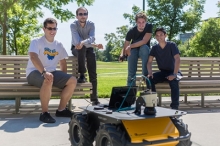UC Merced Professor Stefano Carpin will serve on the executive board of a new multidisciplinary research enterprise called the People and Robots Initiative, by the Center for Information Technology Research in the Interest of Society (CITRIS).
 The initiative will support efforts by faculty members and students working on robotics from the four CITRIS campuses: UC Merced, UC Berkeley, UC Davis and UC Santa Cruz. Building on 40 years of robotics research, a network of alumni, and many active labs and projects, the initiative will draw on innovations in sensors, devices, unmanned aerial vehicles (UAVs), networks, optimization and machine learning to improve human experience in healthcare, manufacturing, transportation, safety and a broad range of other applications that can benefit society.
The initiative will support efforts by faculty members and students working on robotics from the four CITRIS campuses: UC Merced, UC Berkeley, UC Davis and UC Santa Cruz. Building on 40 years of robotics research, a network of alumni, and many active labs and projects, the initiative will draw on innovations in sensors, devices, unmanned aerial vehicles (UAVs), networks, optimization and machine learning to improve human experience in healthcare, manufacturing, transportation, safety and a broad range of other applications that can benefit society.
“Robotics is experiencing major growth right now,” Carpin said. “There are so many opportunities. This is the right moment to create the critical mass that goes beyond any single campus.”
UC Merced’s robotics research dates back nearly to the campus’s opening, even winning the 2009 world championship at the RoboCup Rescue Virtual Robots Competition.
“Even for a small campus, we have a long history of accomplishments,” Carpin said.
“The People and Robots Initiative will catalyze new research in engineering, computer science and the humanities that focuses on the central role of humans,” initiative Faculty Director Ken Goldberg, of UC Berkeley, said.
The new initiative already involves more than 60 faculty members, several from UC Merced.
Primary research themes in the new CITRIS People and Robots Initiative include cloud robotics, deep learning, human-centric automation and bio-inspired robotics. Robotics and automation are advancing rapidly because of innovations in sensors, devices, UAVs, networks, optimization and machine learning, accelerated by increases in corporate and private investment.
The executive committee, which features one faculty member from Merced, Davis and Santa Cruz, and several from the larger program at Berkeley, is expected to be the catalyst for many multicampus research initiatives under the concept of “multiplicity,” an emerging category of systems where diverse groups of people work together with diverse groups of machines to solve difficult problems.
Research in psychology, law, ethics, art and the humanities is essential to provide historical and cultural context and develop appropriate methods for system and policy design that address human issues such as inclusion, privacy and alienation, CITRIS said. Robotics can also enhance education, inspiring student interest in science, technology, engineering and math.
People and Robots will address challenges by catalyzing new research and developing new software, datasets, seminars and collaborations with industry, labs and public outreach.
“The value of robotics is in the software,” Carpin said. “Tuning this software requires human interaction to demonstrate examples in an ongoing manner. We see robots and humans as working closely together, rather than robots operating purely autonomously.”



